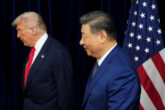
July 20, 2024
How AI is changing warfare
It is unclear whether the PLA has the tech talent to create world-class systems, he points out, and its centralised decision-making might impede AI decision-support. Many Chinese experts are also worried about “untrustworthy” AI. “The PLA possesses plenty of lethal military power,” notes Jacob Stokes of CNAS, another think-tank, “but right now none of it appears to have meaningful levels of autonomy enabled by AI”.
China’s apparent sluggishness is part of a broader pattern. Some, like Kenneth Payne of King’s College London, think AI will transform not just the conduct of war, but its essential nature. “This fused machine-human intelligence would herald a genuinely new era of decision-making in war,” he predicts. “Perhaps the most revolutionary change since the discovery of writing, several thousand years ago.” But even as such claims grow more plausible, the transformation remains stubbornly distant in many respects.
Read the full story from The Economist.
More from CNAS
-
Chinese Maker of Bitcoin-Mining Machines Is a Security Threat, Says Expert
Bloomberg News reports that a Chinese manufacturer, Bitmain Technologies Ltd, that sells most of the world’s Bitcoin-mining machines — including 16,000 of them to a venture ba...
By David Feith
-
Indo-Pacific Security / Energy, Economics & Security
North Korea’s Provocations, Power Plays, and Shifting AlliancesTensions on the Korean Peninsula have reached a new and dangerous threshold. President Lee Jae Myung is warning of a real risk of accidental military clashes, as the situation...
By Dr. Go Myong-Hyun
-
Indo-Pacific Security / Energy, Economics & Security
How to Win the Economic War with ChinaTrump's approach to China has run aground, giving Beijing unprecedented advantage in the economic conflict....
By Edward Fishman & Julian Gewirtz
-
Indo-Pacific Security / Technology & National Security
Sharper: Tech + ChinaRecent talks between President Donald Trump and Chinese Communist Party General Secretary Xi Jinping placed a spotlight on emerging technologies, from high-end chips to minera...
By Charles Horn & Sevi Silvia




